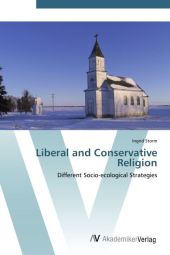 Neuerscheinungen 2012Stand: 2020-01-07 |
Schnellsuche
ISBN/Stichwort/Autor
|
Herderstraße 10
10625 Berlin
Tel.: 030 315 714 16
Fax 030 315 714 14
info@buchspektrum.de |

Ingrid Storm
Liberal and Conservative Religion
Different Socio-ecological Strategies
Aufl. 2012. 148 S.
Verlag/Jahr: AV AKADEMIKERVERLAG 2012
ISBN: 3-639-43770-5 (3639437705) / 3-8364-6309-1 (3836463091)
Neue ISBN: 978-3-639-43770-6 (9783639437706) / 978-3-8364-6309-6 (9783836463096)
Preis und Lieferzeit: Bitte klicken
Revision with unchanged content. In evolutionary theory, the existence of religion has been explained as an adaptive behavioral strategy. This theory can also be used to account for the differences between religious groups. Unique data collected using the Experience Sampling Method (ESM), where participants report their behaviors and experiences on a moment-by moment basis were used to examine differences between liberal and conservative Protestant school students in the United States. The results show that conservative Protestant youth are generally more satisfied, family-oriented and sociable than liberal Protestant youth, but also more dependent on their social environment, which is reflected in a deterioration of their mood when they are alone. Using an independent set of data, linguistic analysis of sermons and mission statements show that liberal churches refer more to individualism, diversity and nurturance, whereas conservative churches focus more on authoritarianism, unity and obedience. The numerous differences between conservative and liberal Protestant denominations suggest that they cannot be ranked along a single continuum of religiosity from "weak" to "strong", nor that one is more universally adaptive than the other. Instead they appear to be qualitatively different socio-ecological strategies, both adaptive in a multiple-niche environment.
MA. Studied Anthropology at Binghamton University, State University of New York. PhD student at the University of Manchester, UK. School of Social Sciences.


